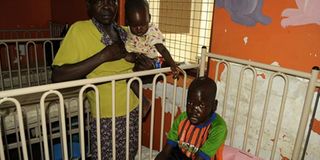Ferrying nodding patients to Mulago was uncalled for: WHO

Ms Concy Atoo, attends to her son Simon Opio, 15, at Mulago Hospital where 24 nodding disease patients were brought on Friday. Ms Atoo, a mother of seven, says two of her children are at home battling the nodding disease. PHOTO BY STEPHEN OTAGE.
What you need to know:
The WHO representative to Uganda says the move could have put the children’s life in danger but MP Beatrice Anywar says her action was due to slow response by government.
Kampala
The move by Kitgum Woman MP Beatrice Anywar to transport nodding disease victims to Mulago Hospital was uncalled for since government had already put up centres in the affected districts to manage the disease, the WHO country representative, has said.
Although Ms Anywar says her action was informed by government’s slow response to the disease, Dr Joaquim Saweka, says the move could have put the lives of the children at risk.
“Mulago hospital is a referral hospital and these children should only have been brought after the centres established in the three affected districts have failed. Bringing the children to Mulago was wrong,” said Dr Saweka yesterday at a press conference at the Media Centre in Kampala.
Non contagious
The WHO official also disagreed with Mulago Hospital boss Byarugaba Baterana on why hospital management on Sunday blocked the media from taking photos and videos of the victims.
Dr Byarugaba had told journalists that they wanted to prevent possible transmission of the disease since its mode of spread is not yet clear.
But Dr Saweka said available evidence does not suggest that the disease is contagious. “Until we discover the cause and the mode of spread of the disease, the evidence available show that the disease is not spread from one person to another,” he said.
Health minister Christine Ondoa said barring journalists was to minimise interference with the work of medical personnel handling the children.
But our reporters who visited the hospital said the children were seated on the floor of the pediatric ward at the Acute Assessment Centre-with no medical officials in sight.
The patients attendants dismissed the hospital’s argument that the media was barred from photographing them because the hospital respects their privacy and confidentiality, arguing that even when they were in Kitgum, the local authorities stopped journalists from coming to the villages to witness the situation.
Dr Ondoa said 20 of the victims brought to Mulago are between five and 15 years, and five between 16 and 25 years, while 70 medical workers are being trained at Kitgum Hospital on how to manage the symptoms of the disease.
Centres to open
She said the centres established will with effect from March 9 be open to all families of children suffering from nodding disease.
The Ministry of Finance, by close of last week, had accepted the Shs7b supplementary budget as asked by the health ministry, part of which will be used to implement effect interventions in the first phase.
Health ministry officials say Shs3.5b of the money will be used for treatment, food and equipping the centres in the first phase.
The nodding disease has affected more than 3,000 children in northern Uganda and so far killed at least 200. The health ministry is using epilepsy drugs to control the symptoms that include head nodding, seizures, flow of saliva, physical and mental stunting.



